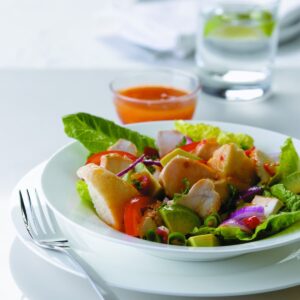
Cutting out foods may not be the only way to deal with the discomfort of heartburn, says Stephanie Osfield.
Food is one of the greatest joys of life, but for some people, after the pleasure comes terrible pain. Heartburn has many names including ‘indigestion’ and ‘acid reflux’. It is a common complaint — it’s estimated seven in 10 of us are likely to suffer this uncomfortable sensation at some point in our lives.
Heartburn happens when the valve between the stomach and oesophagus opens more than it should, allowing powerful acid to rise from the stomach into the lower oesophagus. “It results in a burning sensation in the chest or throat, sometimes accompanied by a bitter or sour taste in the mouth, or other issues like a persistent cough and hoarse voice,” explains dietitian Melanie McGrice.
What causes it?
Anything that puts a lot of pressure on the stomach can trigger an attack — eating a lot at once, lying down too soon after a meal or exercising after eating.
Pregnancy is also a common trigger as the baby can put pressure on the stomach. Sometimes irritable bowel syndrome (IBS) causes severe bloating which puts tension on the stomach, leading to heartburn.
McGrice also points out that a hectic lifestyle can play a major role.
“The common scenario is people skip breakfast, drink lots of caffeine, eat something small on the run, then consume most of their day’s food in one sitting at dinner,” she explains.
A healthier approach is to eat three regular meals or six smaller ones, to see if the lower volume of food helps reduce the reflux.
It’s also helpful to sit upright during and after meals and avoid slouching in a reclining armchair.
When we’re in a hurry, it’s easy to quickly shovel in food, which can bring on indigestion. “Eating slowly and mindfully with small mouthfuls, chewed well, can help reduce heartburn symptoms,” McGrice adds.
Trigger foods
These foods and drinks are common culprits, so try our handy tips.
Caffeine
Tea and coffee may cause changes in stomach acid. Caffeine can also increase the pressure on the valve in your lower oesophagus, which leads to reflux.
TIP: Order weak coffees or make your own milder version at home. Reduce tea strength by using tea bags or only steeping loose-leaf tea for a few minutes.
Alcohol
For some of us, alcohol acts as an irritant in the gut. Some people may also find they can tolerate alcohol for one day but not several days in a row.
TIP: Choose a lower alcohol beverage and drink it with a meal, not on an empty stomach. Avoid bubbly or any carbonated drinks, which can bring on an attack.
Citrus fruits and tomatoes
Stomach acid is much stronger than acid in foods such as oranges, lemons and tomatoes. However, these foods and juices could worsen reflux.
TIP: Eat smaller serves of potentially irritating foods, and monitor how this affects your symptoms.
Fatty foods
These can prevent the lower oesophageal sphincter from fully tightening, allowing stomach acid into the oesophagus. Fat can also slow the stomach emptying.
TIP: Avoid fried meals, rich meat dishes and creamy sauces. Cook meals at home with minimal oil or fats.
Spices
Hot foods such as chilli, peppers and aromatic garlic and onion are gastric stimulants. In response, our bellies can produce more acid, leading to heartburn symptoms.
TIP: Eat milder curries, use less spices and swap garlic and onions for milder herbs such as chives.
Peppermint tea
The comforting effect of peppermint may encourage greater relaxation of the lower oesophageal sphincter, allowing acid to flow back into the oesophagus.
TIP: Choose a different herbal tea such as calming chamomile.
When it burns all the time
When heartburn is persistent and occurs more than twice a week, gastroesophageal reflux disease (GORD) may be diagnosed. “Minimising your intake of trigger foods is important,” says McGrice, “but resist the impulse to ban foods completely from your diet, as you risk not getting enough important nutrients.”
Medications can help to treat GORD. Proton pump inhibitors (PPIs) reduce the level of stomach acid. Although these drugs are considered to be very safe, they do have potential side effects, and can reduce your absorption of nutrients including calcium, iron, vitamin B12 and vitamin C. That doesn’t mean you should stop taking your medication, as untreated GORD can cause sleep loss, reduce appetite, and even increase the risk of developing oesophageal cancer.
You may be able to reduce heartburn pain and the need for medication by making simple changes to your eating habits. “I encourage my patients to start with the fours ‘P’s,” says dietitian Caroline Salisbury:
- Plan: Cook ahead and spread out nutritious meals and snacks evenly across the day.
- Pace: Eat slowly in a calm environment.
- Portion: Avoid gorging on large, dense meals and snacks.
- Position: Sit upright and leave 2-3 hours between your last meal and going to bed.
Soothing foods
Milk and yoghurt
Many people report that these foods soothe their painful symptoms of heartburn.
Carbohydrates
Some sufferers find bread, pasta and rice help settle heartburn. “This may be because they help soak up some of the stomach acid,” says dietitian Caroline Salisbury. Unfortunately, both these food solutions aren’t healthy long-term fixes.
If you have symptoms of heartburn it is important to see your GP or a gastroenterologist for advice.
Did you know? Seven in 10 of us are likely to suffer from heartburn at some point.
Article sources and references
- Digestive Health foundation. 2010. Information about Heartburn (Oesophageal Reflux). www.gesa.org.au Accessed September 2015https://cart.gesa.org.au/membes/files/Consumer%20Information/Heartburn.pdf
- Seto CT et al. 2014. Prolonged use of proton pump inhibitor reduces microbial diversity: implications for Clostridium difficile susceptibility. Microbiome 2:42https://www.ncbi.nlm.nih.gov/pubmed/25426290
- Shah et al. 2015. Proton pump inhibitor usage and the risk of myocardial infarction in the general population. PLoS ONE 10:e0124653https://www.ncbi.nlm.nih.gov/pubmed/26061035
- The Gut Foundation. 2015. Understanding heartburn and reflux. www.gutfoundation.com.auhttp://www.gutfoundation.com.au/publications
www.healthyfood.com










